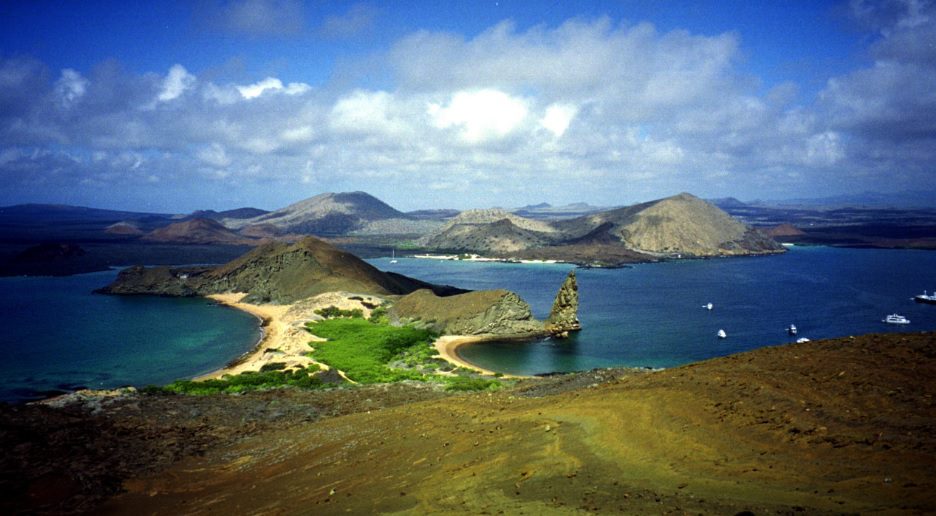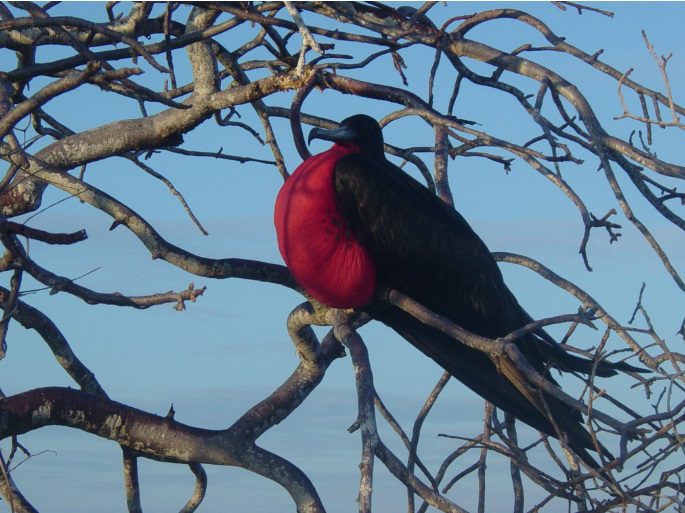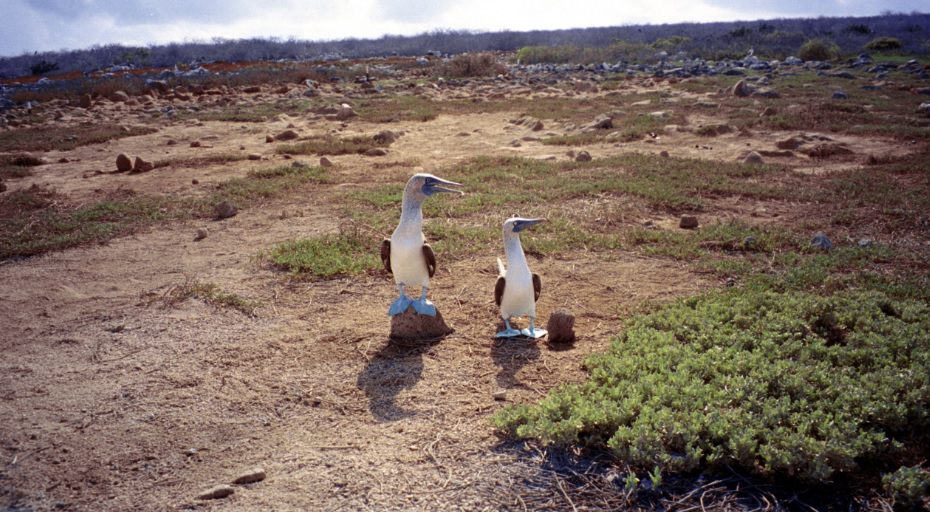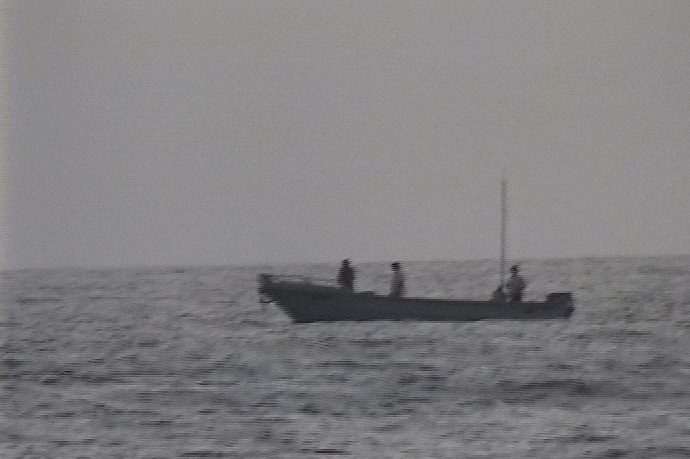Ecuadorian Fisherman
Hello Everyone . Trying to catch up on journaling and e-mails. We’ve been busy being tourists.
Monday, 2230hrs CST, April 5, 2004:
S 00o44.877′, W 090o18.514′
(Puerto Ayora, Galapagos Island)
We did arrive in the Galapagos Island on Tuesday, March 30th, anchoring in Puerto Ayora at midday with our water tanks empty and fuel tanks containing not much more than diesel fumes. (The water tanks were unintentionally drained because the faucet in the “head” had been inadvertently left open. When the water pump was activated, it drained without our knowledge. To prevent this from happening in the future, we will shut off the head faucet completely and use only the manual foot pump. Very important for our upcoming four week transit! )

Since our arrival, the crew of the Lillian B. has been busy exploring the amazing environment of Galapagos. Kay, Matthew and I took an island tour that had us stepping around iguanas, blue footed boobies (you can imagine the T-shirt), red crabs, frigate birds, and the ubiquitous sea lions. The tour included snorkeling in reefs teaming with schools of brightly colored fish, penguins, and the occasional shark. Tomorrow, Dick and his wife Suzie, who flew in last Saturday as a surprise, will go on a similar tour. Meanwhile Peter, with his Spanish and youthful energy, is outpacing us all, sight-seeing, snorkeling, surfing, kayaking, hiking, and mingling with the locals. Today, Kay and Matthew boarded a Tame airlines Airbus for the first leg back to the US so I am alone on board Lillian.


To step back in time, on the Sunday prior to arriving in Galapagos, Dick’s statement that we were the only ones on the face of the earth proved to be wrong. Earlier that day, Lillian snagged a line out in bluewater, over 200 miles from land. Apart from acting as an anchor, the immediate concern was that the line could become wrapped in the prop, perhaps irreparably, so Peter pulled out his knife and cut the boat free. Four hours later, Dick called out from his station at the helm that we had company. A small wooden boat, approximately 15 feet in length, had, as Dick recounts, appeared as if out of nowhere and was suddenly running along side. It was a little disconcerting to be thus surprised out in the ocean. Assuming them to be Ecuadorian or Columbian, I called for Peter so we could communicate. Their wooden boat was simple in design, with an outboard, fuel tanks, wooden thwarts for seats, and a small locker at the stern.

No weapons were evident, other than what might be in the stern locker, and there were only three men on board. Coming from a gun culture, the majority of my friends and acquaintances in Alabama were shocked when they learned that we were not bringing a shotgun on board, not to mention an arsenal worthy of Arnold Schwarzenegger. However, I subscribe to the minority opinion that weapons only tend to escalate a situation and are much more likely to get someone killed. I still think weaponless is a better way to travel, but I admit that I was wondering, as three unknown men appeared from nowhere, whether the metallic handle of the bilge pump, stuck out a port hole, would give the illusion of a shotgun barrel. In any case, we appeared evenly matched with Dick, Peter and me standing on the deck of Lillian … and they looked friendly enough. Besides, they didn’t know that Arnold wasn’t on board.
I was very grateful for Peter’s fluent Spanish. It was apparent that the fishermen were asking details about whence we had come and where we were going. I heard the words “Panama” and “Galapagos,” and then Peter explained to Dick and me that they were fishermen, with a mother ship nearby, and that they were hungry. As with panhandlers on land, I wasn’t sure whether we were being hustled or if they were truly hungry. In either case, the most prudent response seemed to be to give them a small donation of food. Peter retrieved two cans of Spam along with some of the still-warm, delicious, chocolate brownies that Matthew had just baked. The fishermen thanked Peter and retreated a few hundred yards where they immediately consumed both brownies and Spam. Once finished with this epicurean combination, they disappeared over the horizon.
Less than an hour later, a second boat appeared as abruptly as the first. Again Peter served as communicator. This time, it was three different fishermen interested in whether we had a motor. Given our low fuel, we had been under sail the entire afternoon and I listened as Peter bent the truth by saying “no motor.” I suspected they were looking for the cause of their parted line, but I was not inclined to confess. Despite the three diesel containers on our deck, the fishermen seemed satisfied that we were only a sailboat, with no sharp propeller. They then motioned for us to alter course. Off in the distance was a marker that lay on the eastern boundary of their fishing grounds. We consented in our best accommodating manner. Peter finished the conversation explaining that he had spent half a year living in Equator. He and the fishermen subsequently exchanged brief opinions on the beauty of Ecuadorian women as we waved goodbye. With only our sails, it took us an hour to beat to windward to clear the mark, but we did not want to reveal our engine. As the sunset, we finally turned the corner and resumed course. Shortly before midnight, Dick called out with some alarm that we again had company. Off to port, the lights of the mother ship could be seen, but she never came any closer than a couple of miles.
That was the last we saw of them. In Galapagos, one of the hotel owners warned us of the dangers of piracy off the Columbian Pacific coast. And Peter, armed with a machete and climbing axe, was once robbed at gunpoint in Ecuador. However, for what it is worth, my intuition tells me that our open ocean visitors were exactly as they appeared, poor hungry fishermen who, if they hadn’t lost precious gear, at least would have to re-splice a neatly cut line. We could have given them, as reparation, one of the lines that we had needed for the Panama Canal, but which was no longer essential to us. However, that would have required confessing that we had cut the line. Instead, out of anxiety and caution, we took a path of denial and deceit. Thus went our first try at international diplomacy.